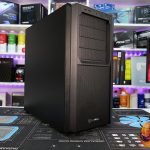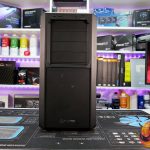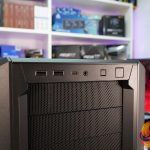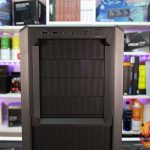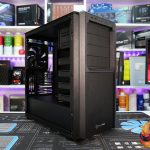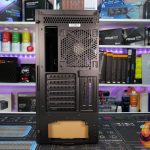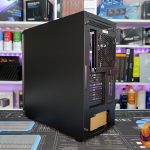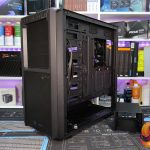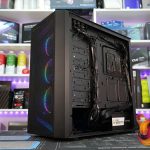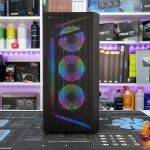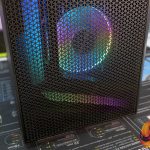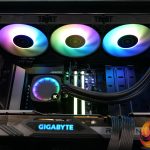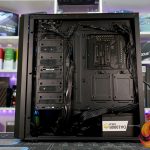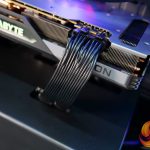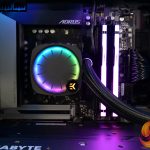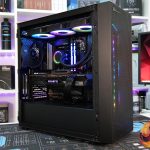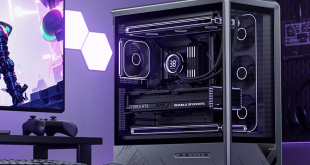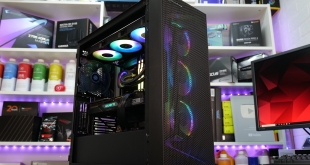
Today we take a look at two ATX mid-tower cases from Silverstone. The Seta D1 and Seta H1 are based on an identical chassis structure but are very different cases. The Seta H1 has been around for a while and sports a high airflow open design, ideal for gaming builds with big graphics cards and water cooling while the D1 has recently launched and is aimed at users that need versatile storage options and space for optical drives. So let’s take a quick look at both cases, pick one and build a system.
First, let’s take a look at the Silverstone Seta D1 which is the latest ATX mid-tower chassis to be launched into the Seta line-up. The Seta D1 is based on the same chassis design as previous Seta cases such as the Q1 and H1 but is aimed at users who prioritise storage and optical drives. The case has a modular front section that can be configured in several different layouts to suit the user’s ideal mix of storage, optical drives and cooling.
As well as being able to house multiple optical drives and storage devices in both 3.5” and 2.5” formats, the Seta D1 can also support large graphics cards, motherboards up to E-ATX form factor and radiators up to 360mm. To install a 360mm radiator in the front of the case, all storage and optical bays must be removed, however, 360mm radiators can be installed in the roof of the case with some of the storage and optical bays in place which is useful.
Silverstone Seta D1 Features:
- Modular chassis front section that supports various configurations and combinations of storage, optical drive bays and radiators. Users can set up the front of the case to suit their system demands.
- Versatile support for air and water cooling with room for air coolers up to 182mm tall, radiators up to 360mm long and up to seven 120mm fans.
- Extensive hardware support includes E-ATX, ATX, Micro-ATX and Mini-ITX motherboards, graphics cards up to 394mm long and power supplies up to 250mm in length.
- Two additional 2.5” storage bays are located on the rear of the motherboard tray and two more 3.5” storage drives can be installed in the removable caddy beneath the power supply should.
- Front I/O connectivity includes two USB 3.0 Type-A ports, a single USB Type-C port and a combined 3.5mm audio port.
Specifications
- Motherboard – SSI-CEB, E-ATX, ATX, Micro-ATX, Mini-ITX
- External Drive bay – 25″ x 4 (HDD combo bay supports up to 3)
- Internal – 5″ x 2, 2.5″ x 2, 3.5″ / 2.5″ x 6
- Cooling system Front – 120mm x 3 / 140mm x 3 (140mm black fan x 2 included)
- Cooling system Rear – 120mm x 1 / 140mm x 1 (140mm black fan x 1 included)
- Cooling system Top –120mm x 3 / 140mm x 2 / 160mm x 2
- Radiator support – (Front) 120mm/140mm/240mm/280mm/360mm, (Top) 120mm/140mm/240mm/280mm/360mm, (Rear) 120mm/140mm
- Limitation of CPU cooler – 182mm
- Expansion slot – 7+2
- Limitation of expansion card – Length: 394mm (with front fans installed),275mm (with front single bay drive cage and fans installed) Width: 188mm
- Power supply – Standard PS2 (ATX)
- Limitation of PSU – 250mm
- Front I/O port – USB Type-C x 1, USB 3.0 x 2, Combo audio x 1
- Dimension – 232mm (W) x 493.9mm (H) x 492.7mm (D), 56.46 litres
- Net weight – 28 kg
The Seta H1 is the one we chose for the build in the video as it is better suited to the gaming-orientated hardware that we have selected. The Seta H1 should be a good chassis for high-end gaming builds as it supports a wide range of hardware including motherboards up to E-ATX form factor, big graphics cards and has support for multiple large radiators. It is also equipped with a full-length front mesh panel for optimal cool air intake with ARGB lighting and two custom 160mm fans pre-installed behind the mesh panel.
Silverstone Seta H1 Features:
- Full-length perforated front mesh panel with embedded ARGB lighting to provide optimal airflow to internal components and a vibrant aesthetic.
- Ample internal space for high-end hardware including motherboards up to E-ATX form factor, graphics cards up to 394mm long, big air coolers up to 182mm tall and power supplies up to 250mm long.
- Extensive air and water cooling support with space for dual 360mm radiators and up to seven 120mm/140mm chassis fans.
- Multi-function brackets at the front of the chassis can be utilised for mounting 2 x 2.5” SSSD drives, pump res combos or alternatively used as cable management cover panels for a clean interior look.
- Front I/O connectivity consists of two USB 3.0 Type-A ports, one USB Type-C port and a single combined 3.5mm audio jack.
Specifications
- Motherboard – SSI-CEB, E-ATX, ATX, Micro-ATX, Mini-ITX
- Internal – 2.5″ x 2, 3.5″ x 2
- Cooling system Front – 120mm x 3 / 140mm x 3 (160mm black fan x 2 included)
- Cooling system Rear – 120mm x 1 / 140mm x 1 (140mm black fan x 1 included)
- Cooling system Top –120mm x 3 / 140mm x 2 / 160mm x 2
- Radiator support – (Front) 120mm/140mm/240mm/280mm/360mm, (Top) 120mm/140mm/240mm/280mm/360mm, (Rear) 120mm/140mm
- Limitation of CPU cooler – 182mm
- Expansion slot – 7+2
- Limitation of expansion card – Length: 394mm (with front fans installed),275mm (with front single bay drive cage and fans installed) Width: 188mm
- Power supply – Standard PS2 (ATX)
- Limitation of PSU – 250mm
- Front I/O port – USB Type-C x 1, USB 3.0 x 2, Combo audio x 1
- Dimension – 232mm (W) x 494mm (H) x 480mm (D), 55.01 litres
- Net weight – 28 kg
Build Hardware Specification:
- CPU – AMD Ryzen 9 7900X
- Motherboard – Gigabyte X670 Aorus Elite AX
- Graphics Card – Gigabyte Radeon RX 7900XT Gaming OC
- Memory – 32GB (2 x 16GB Modules) Kingston Fury Beast DDR5-6000 AMD EXPO
- Storage – 2TB WD_Black SN580 PCIe Gen 4 NVME M.2 SSD
- CPU Cooler – EK-Nucleus AIO CR360 LUX D-RGB
- Power Supply – Silverstone Decathlon Series 1000W DA1000R Cybenetics Gold
- Case fans – 3 x Phanteks D30-120 (Regular)
- Chassis – Silvertstone Seta H1
- Operating System – Windows 11
Seta H1
Pros:
- High airflow front panel keeps components cool.
- Sturdy Build Quality.
- An easy case to work with
Cons:
- The price might be slightly high.
- Cable management covers are not that useful.
- Only available in black.
KitGuru Says: The Silverstone Seta H1 is a decent case to build a high-end gaming system with. Some design choices such as the cable management covers might not be totally necessary but the case is easy to use, feels sturdy and can keep high-end components cool, so it might be one to check out for your next gaming build.
 KitGuru KitGuru.net – Tech News | Hardware News | Hardware Reviews | IOS | Mobile | Gaming | Graphics Cards
KitGuru KitGuru.net – Tech News | Hardware News | Hardware Reviews | IOS | Mobile | Gaming | Graphics Cards


